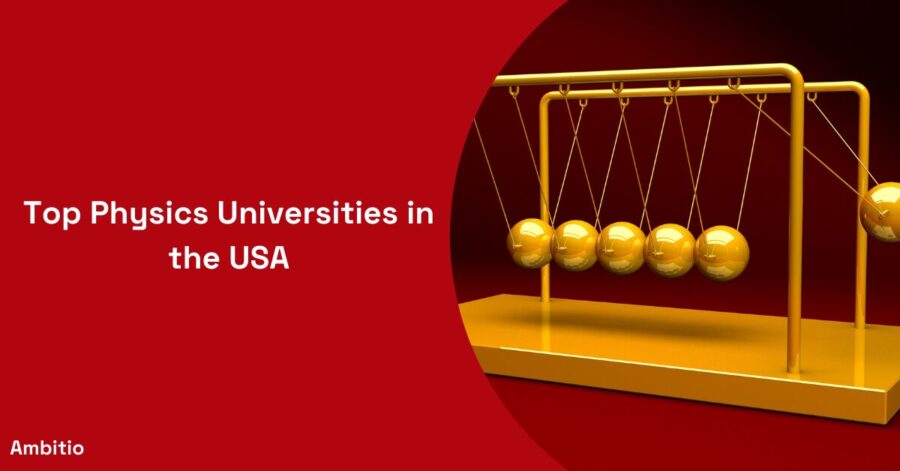13 December 2024
6 minutes read
Top Physics Universities in the USA

The quest for knowledge in the realm of physics has led us to explore the universe’s most profound mysteries, from the minuscule particles that compose our existence to the vast expanses of the cosmos.
In 202, the global academic community continues to celebrate the institutions that stand at the forefront of this exploration.
Through an intricate blend of theoretical physics, quantum mechanics, and astrophysics, these universities not only mold the next generation of physicists but also lead groundbreaking research that pushes the boundaries of our understanding.
This article dives into the 2023 World University Rankings, focusing on the crème de la crème of physics and astronomy education across the globe.
Best Global Universities for Physics in 2023
The QS World University Rankings and other prestigious lists have become invaluable resources for prospective students and academics alike, offering insights into the institutions that lead in the field of physics.
The criteria for these rankings include academic reputation, employer reputation, faculty/student ratio, citations per faculty, international faculty ratio, and international student ratio.
Below, we explore the top contenders who have consistently excelled, making significant contributions to the physics community and beyond.
Top Universities for Physics in USA
The 2024 world university rankings unveil the premier institutions leading the charge in physics education and research.
These universities, including luminaries like the Massachusetts Institute of Technology, Stanford University, and the University of California, Berkeley, are renowned for their rigorous programs, distinguished faculties, and groundbreaking research contributions.
| University Name | Annual Fees (USD) | Notable Programs |
|---|---|---|
| Massachusetts Institute of Technology (MIT) | ~$53,790 | Quantum Physics, Astrophysics, Theoretical Physics |
| Stanford University | ~$56,169 | Particle Physics, Cosmology, Quantum Mechanics |
| Harvard University | ~$51,143 | Astrophysics, Condensed Matter Physics, Quantum Field Theory |
| California Institute of Technology (Caltech) | ~$56,862 | Experimental Physics, Theoretical Astrophysics, Quantum Information Science |
| University of California, Berkeley (UC Berkeley) | ~$43,980 (out-of-state undergrad) | Nuclear Physics, Quantum Mechanics, Statistical Mechanics |
| Princeton University | ~$53,890 | High Energy Physics, Plasma Physics, Quantum Physics |
| University of Chicago | ~$60,552 | Astrophysics, Condensed Matter Physics, Particle Physics |
| Columbia University | ~$61,788 | Atomic, Molecular & Optical Physics, Theoretical Physics |
| University of Cambridge (UK) | ~$58,000 (international) | High Energy Particle Physics, Astrophysics, Quantum Physics |
| ETH Zurich (Switzerland) | ~$1,229 (domestic) / ~$1,229 (international) | Quantum Computing, Nanotechnology, Particle Physics |
From theoretical physics to quantum mechanics and astrophysics, these top universities offer unparalleled opportunities for students to delve deep into the mysteries of the universe. With state-of-the-art facilities and vibrant academic communities, they stand at the forefront of advancing knowledge and innovation in the field of physics.
Understanding the Application Process
Navigating the application process for physics programs at top universities requires a strategic approach.
With the 2024 World University rankings as a guide, aspiring physicists must carefully research and select institutions that align with their academic and research interests.
This process involves understanding each university’s specific requirements, from standardized test scores to personal statements and letters of recommendation.
- Research and Selection: Begin by identifying universities that excel in physics, utilizing world university rankings and subject-specific rankings for 2023 to shortlist institutions that match your academic and research interests.
- Understand Requirements: Each university has its unique set of admission requirements. These may include standardized test scores (e.g., GRE, SAT), language proficiency tests (TOEFL, IELTS for non-native speakers), and specific prerequisites for physics programs.
- Prepare Your Application: Focus on gathering all necessary documents, such as transcripts, letters of recommendation, a statement of purpose (detailing your academic interests and goals), and any evidence of research experience or publications.
- Financial Planning: Investigate scholarship opportunities, assistantships, and financial aid options early in the application process. Top universities often offer competitive funding packages for promising students.
- Submission Deadlines: Pay close attention to application deadlines, which can vary significantly between institutions. Early preparation will ensure you have ample time to complete each application component thoughtfully.
- Interview Preparation: Some programs may require interviews as part of the application process. Prepare by reviewing your research interests, and future goals, and understanding current trends and advancements in physics.
- Follow-Up: After submitting your applications, monitor their status and be prepared to submit any additional information if requested by the university.
Prospective students must also consider application deadlines and financial aid opportunities, ensuring they are well-prepared to embark on this crucial step of their academic journey.
The application process is a critical gateway to accessing the best physics programs around the world, setting the stage for future success in the field.
Eligibility Criteria
Eligibility criteria for top-ranked physics programs can be as diverse as the field of physics itself.
Candidates must demonstrate a strong foundation in science and mathematics, with specific requirements varying by institution and program.
Typically, this includes outstanding academic records, proficiency in English (for non-native speakers), excellent letters of recommendation, and a compelling statement of purpose.
- Academic Record: Strong performance in undergraduate (and possibly graduate) studies, especially in physics and related subjects.
- Standardized Tests: Required scores on the GRE, and for non-native English speakers, language proficiency tests like the TOEFL or IELTS.
- Research Experience: Demonstrated experience in research, through projects, internships, or publications, is highly valued, especially for graduate programs.
- Letters of Recommendation: Letters from academic and/or professional references that attest to the applicant’s abilities, character, and potential in the field of physics.
- Statement of Purpose: A compelling statement that outlines your academic interests, research goals, and reasons for choosing the specific program.
- Additional Requirements: Some universities may have additional criteria, such as specific coursework, GPA minimums, or interviews.
For those targeting the highest echelons of physics education, as highlighted in the 2024 university rankings by subject, showcasing research experience and a passion for physics can significantly enhance their application, aligning with the rigorous standards of the world’s top universities for physics.
The Future of Physics Education
The future of physics education is poised at the exciting intersection of innovation, interdisciplinary collaboration, and global engagement.
As we look beyond 2023, physics programs are increasingly incorporating cutting-edge technologies and methodologies, from quantum computing to astrophysics, to prepare students for the challenges of tomorrow.
- Interdisciplinary Approach: Greater emphasis on integrating physics with other scientific disciplines, such as biology, chemistry, and computer science, to tackle complex research questions.
- Advanced Technologies: Incorporation of cutting-edge technologies in research and teaching, including quantum computing, machine learning, and virtual reality simulations.
- Global Collaboration: Increased opportunities for international research collaborations and exchanges, fostering a global community of physicists.
- Diversity and Inclusion: A stronger focus on creating inclusive and diverse academic environments that encourage participation from underrepresented groups in STEM.
- Sustainability and Ethics: Integration of sustainability and ethical considerations into physics education, reflecting the growing importance of these issues in scientific research and application.
The emphasis on diversity, sustainability, and ethical considerations in scientific inquiry reflects a broader shift towards a more inclusive and responsible approach to education.
With advancements in digital learning and international collaboration, physics education is evolving to offer students a dynamic and holistic learning environment, readying them for pivotal roles in shaping the future of science and technology.
Career Prospects
A degree in physics opens up a diverse range of career paths, reflecting the versatility and demand for physics graduates in various sectors. Below is an overview of potential career prospects for physics graduates:
- Academia and Research: Many physics graduates pursue careers in academic institutions or research labs, contributing to scientific advancements in areas like quantum computing, astrophysics, and materials science.
- Engineering: Physics graduates are well-suited for roles in aerospace, automotive, and software engineering, where they apply their problem-solving skills and technical knowledge.
- Finance and Data Science: The analytical and quantitative skills of physics graduates are highly valued in finance and data science, leading to roles in algorithmic trading, risk analysis, and big data analytics.
- Technology and Innovation: Graduates often find opportunities in the tech industry, working on developing new technologies, electronics, and renewable energy solutions.
- Healthcare and Medical Physics: Some physics graduates specialize in medical physics, contributing to the development of medical imaging technologies, radiation therapy, and health physics.
The field of physics not only offers a profound understanding of the universe but also equips students with a versatile skill set, opening doors to a wide array of career opportunities across industries.
Conclusion
The 2024 World University Rankings illuminate the path for future physicists, guiding them to the institutions where their academic and research ambitions can flourish.
These universities are not just educational establishments but beacons of knowledge that contribute significantly to our understanding of the universe.
As we look towards the future, the field of physics remains a cornerstone of scientific advancement, with these top universities leading the charge.
FAQs on Studying Physics
Q1. Can I apply to physics programs in the US if I studied a different undergraduate major?
Yes, but you may need to complete prerequisite courses in physics and mathematics.
Q2. How important is research experience for applying to graduate physics programs?
Very important. Research experience demonstrates your ability to engage with scientific inquiry and contributes significantly to your application.
Q3. What financial aid options are available for international students?
Many universities offer scholarships, grants, and assistantship positions to international students based on merit and financial need.
Q4. Are there any part-time physics programs for working professionals?
Yes, some institutions offer part-time or online programs designed to accommodate the schedules of working professionals.
Q5. How can I improve my chances of admission to a top physics program?
Focus on excelling academically, gaining research experience, building a strong application package, and tailoring your statement of purpose to each program’s unique offerings and research interests.

You can study at top universities worldwide!
Get expert tips and tricks to get into top universities with a free expert session.
Book Your Free 30-Minute Session Now! Book a call now




























